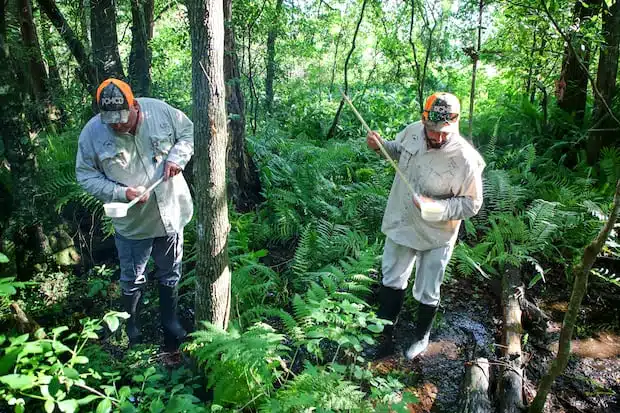For Pasco Mosquito Control, chasing deadly pests is an endless cycle
ODESSA — We pulled up to a Circle K in an orange pickup truck with a mosquito printed on the side. My insect guide, Kenny Johnson, popped into the store, emerging with an Arizona iced tea and a scratch-off. He climbed back in and slid the ticket behind the visor.
“Dollar and a dream,” he said.
Indeed. This whole day would be a Floridian gamble of sorts, a displeasure hunt through Pasco County’s mosquito population, a soggy summer sampling of nature’s peskiest pests that cannot be defeated, merely controlled.
Here’s why I found myself in the cab hustling toward a youth baseball field, “Born in the USA” on FM radio, flipping through a handbook for buzzy bits of knowledge: “Aedes taeniorhynchus, black salt marsh mosquito, basal bands of white scales across abdominal segments and center of proboscis.”
In the spring, I wrote the saga of being victimized by a score of mosquitoes on Dunedin’s Honeymoon Island. Scars still dot my leg like stars on Orion’s belt. I don’t want to talk about it!
Someone from the Florida Mosquito Control Association read it, laughed and offered me and a Times photographer a ride-along with local mosquito fighters. “We promise to provide you with appropriate bug spray,” she wrote, a chilling nod to my ineptitude for outdoor recreation.

I hooked up with the Pasco County Mosquito Control District, which the aforementioned association calls one of the most sophisticated operations of its kind in the country. Created in 1951, the independent taxing district has expanded and faced a share of scrutiny along the way. The district, which has plans for a new $37 million headquarters, has recently been under a microscope for a series of major bookkeeping issues and criticism of the expansion plan.
Nonetheless, executive director Adriane Rogers said she wants Mosquito Control to be a transparent place where residents can see the surprising inner workings of the task.
Did you know know how many types of mosquitoes exist? I didn’t. There are more than 3,500 species on Earth and 45 in Pasco County. Out of that, 15 are a major concern. Either they’re a nuisance, or they spread diseases like Eastern equine encephalitis, West Nile, Zika and dengue fever. The Florida Department of Health has reported 10 state cases of locally acquired dengue in 2024, meaning the virus likely didn’t stem from overseas travel. That includes a case in Pasco.
Pasco mosquito technicians read so much literature during the slow months and set eyes on so many species that they detect nuance on sight. The species that spreads dengue, for example, originates from containers: buckets on porches, old tires collecting rain. One bottlecap can breed 100 mosquitoes.
